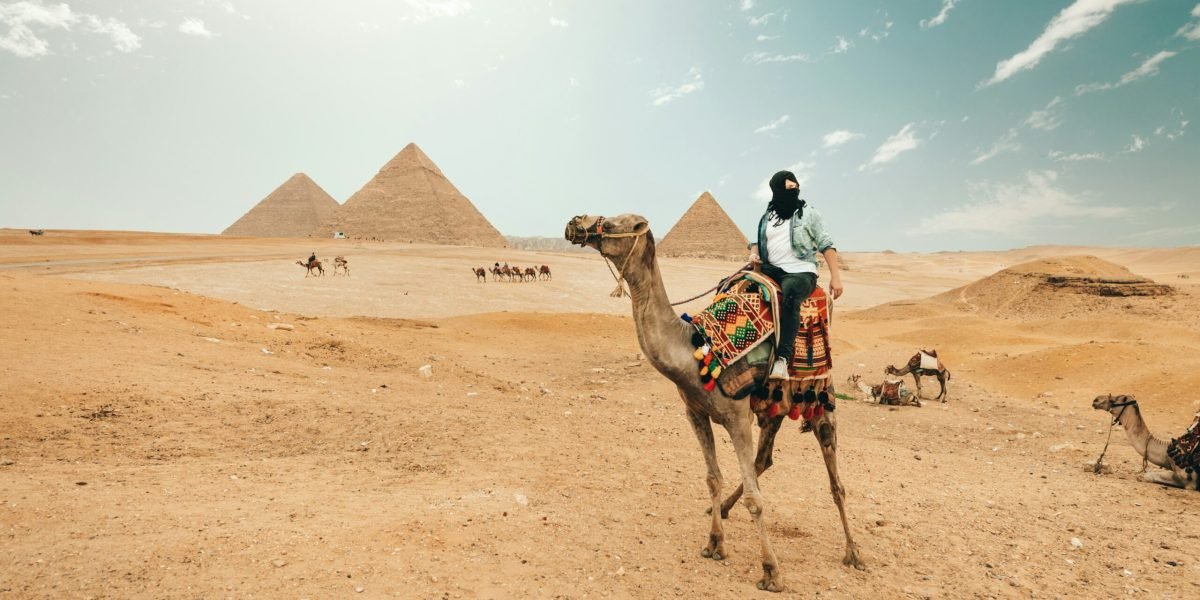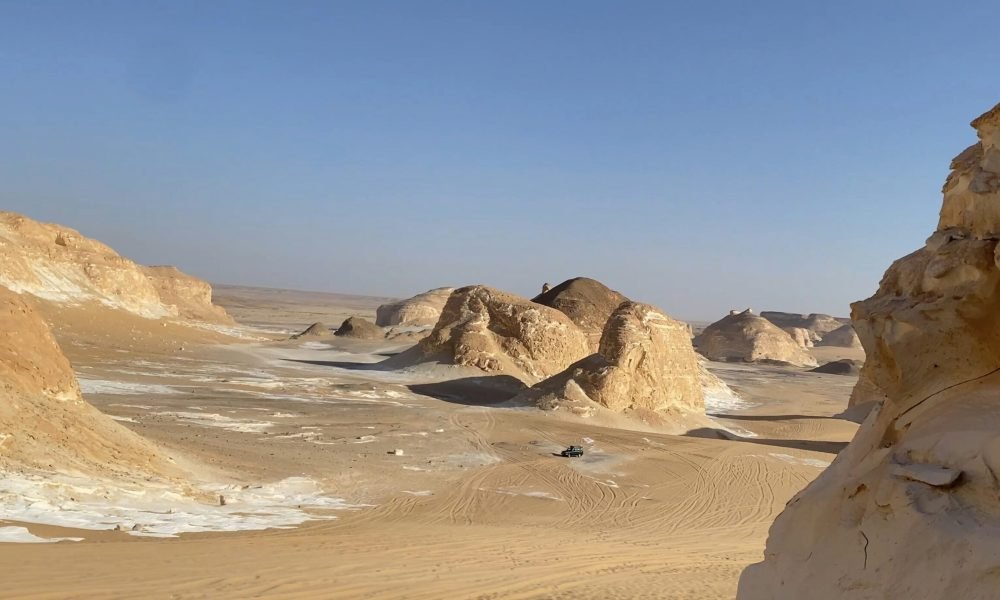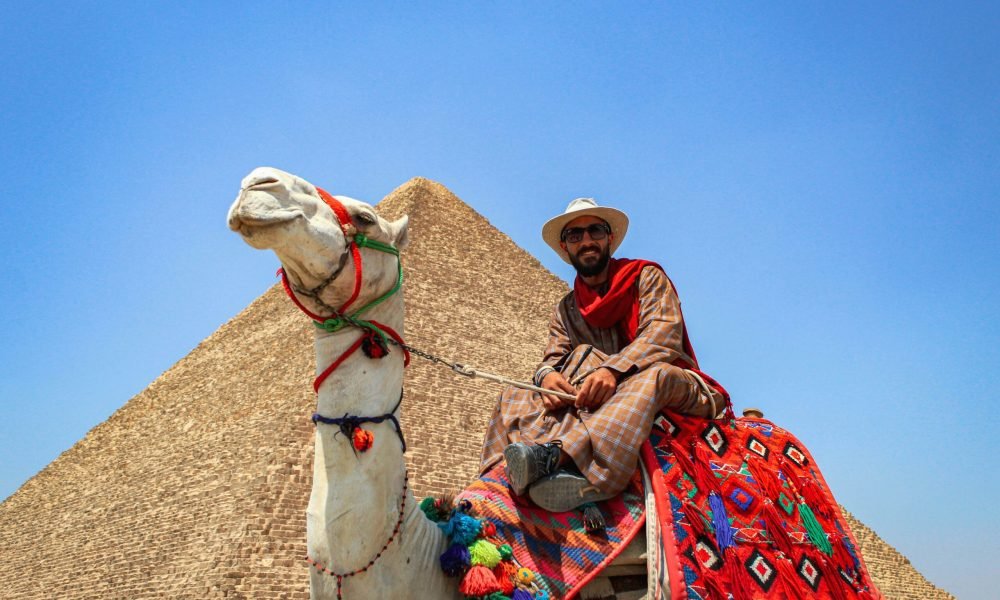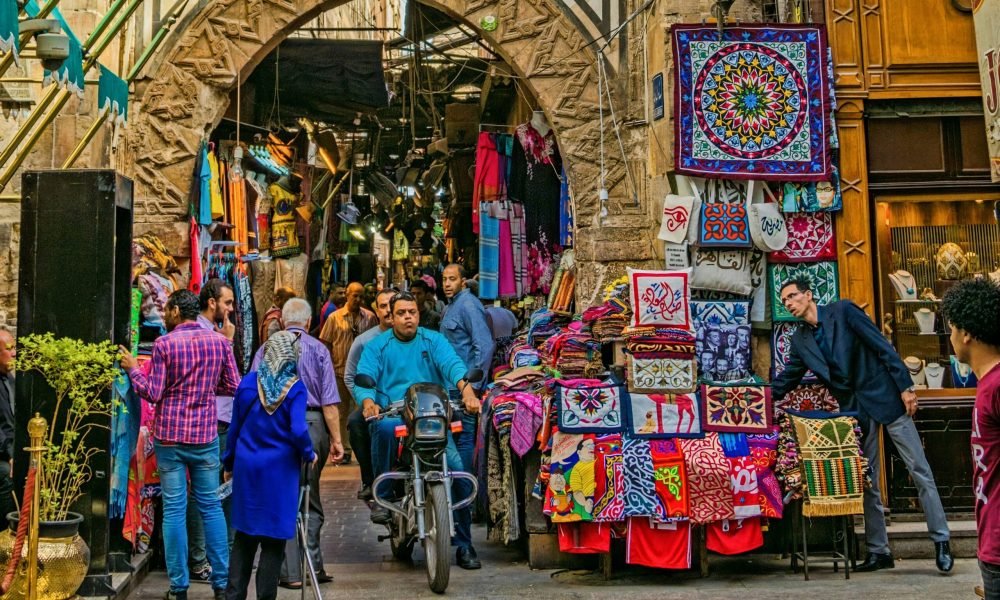20 Best Things to Know Before Traveling to Egypt

When most people think of Egypt, they imagine giant pyramids, golden tombs, and powerful pharaohs. But there’s much more to Egypt than its ancient monuments. It’s a country full of life, traditions, and surprises, home to over 100 million people and one of the oldest continuous civilizations in the world.
Modern cafés stand beside centuries-old mosques. Donkey carts travel the same roads as shiny luxury cars. And the Nile River still plays a big role in everyday life, just as it did during Cleopatra’s time. In places like Aswan, you’ll find colorful markets filled with spices, fabrics, and friendly faces. In Old Cairo, you can hear the soft sound of Sufi chants floating through the air.
Egypt is a mix of old and new, calm and chaos, sacred and everyday. If you travel with an open mind and heart, Egypt will show you stories, beauty, and moments you’ll never forget. Here are the best things to know before traveling to Egypt.

The White Desert in Egypt is a surreal, chalk-white landscape shaped by wind and sand. Ahmed Azab / Unsplash
1. Egypt is More Than Just Pyramids: Prepare to Go Beyond Giza
While the Pyramids of Giza are undoubtedly iconic and a must-see, there’s so much more to Egypt waiting beyond the tourist trail. For a truly enriching experience, venture into the country’s hidden gems. The Siwa Oasis, located near the Libyan border, gives a peaceful escape with palm groves, salt lakes, and ancient mud-brick architecture.
It’s also known for its unique Berber culture and the legendary Oracle Temple visited by Alexander the Great. Far out in the White Desert, travelers can witness surreal chalk formations shaped by wind and time, creating a landscape that looks like another planet.
For a taste of authentic local life, the colorful Nubian villages along the Nile near Aswan welcome visitors with warm hospitality, brightly painted homes, and vibrant traditions passed down through generations. Exploring these lesser-known places shows a different side of Egypt and gives a deeper connection to its rich and diverse culture.
2. Time Runs Differently: Learn About 'Egyptian Time'
In Egypt, locals commonly refer to this flexible approach as “Egyptian time,” where being a little late or even an hour or two is generally acceptable and rarely causes stress. Whether you’re catching a tour, booking a taxi, or meeting someone for dinner, it’s common for times to shift and plans to change unexpectedly.
People don’t see it as rude; they simply follow a cultural norm shaped by a slower, more laid-back pace of life. At first, this relaxed approach to time might feel unusual or even inconvenient, especially if you’re used to a tightly scheduled routine. But learning to adjust can make your journey more enjoyable.
Instead of stressing over delays, you’ll find more joy in spontaneous moments and unexpected experiences. In Egypt, letting go of strict plans often leads to the most memorable adventures—because here, it’s not about the clock but about the connections and stories along the way.

Traditional Dress wearing is one of the best things to know before traveling to Egypt. Noriely Fernandez / Unsplash
3. Dress Like a Local—Respectfully and Comfortably
When visiting Egypt, dressing modestly isn’t just about following rules; it’s a sign of cultural respect, especially in rural areas, traditional neighborhoods, and religious sites. For women, this often means choosing light, breathable outfits that give coverage for the shoulders, chest, and knees, allowing both comfort and cultural respect.
Men typically wear pants and short- or long-sleeved shirts rather than shorts and tank tops. While cities like Cairo or Alexandria may feel more relaxed in terms of dress, modesty is still appreciated and can help travelers avoid unwanted attention.
At the same time, Egypt’s climate, especially in the summer, can be intensely hot, so it’s important to choose breathable fabrics like cotton or linen. A lightweight scarf can also come in handy not just for covering your head in mosques but for sun protection and dusty environments.
Blending in with local dress not only shows respect but also helps you feel more comfortable and confident as you explore the country. This is one of the best things to know before traveling to Egypt; it helps you stay comfortable and respectful wherever you go!

Cairo’s chaos is a lively mix of noise, crowds, and nonstop energy. Thales Botelho / Unsplash
4. Cairo Chaos: Mastering the Art of Navigating the Capital
Cairo is home to more than 20 million people: it’s bursting with energy day and night. The streets are alive with honking horns, busy markets, and crowds of people going about their day. At times, especially during rush hour, the traffic can feel intense; cars inch forward, and crossing the street becomes a mini adventure.
The air is often filled with the sounds of traffic and a layer of dust, but it all adds to the unique rhythm of the city. Cairo doesn’t slow down, and that’s what makes it so exciting.
Try to avoid peak hours when planning your outings and give yourself extra time to get anywhere. Ride-sharing apps like Uber and Careem are more reliable than hailing a cab on the street and help avoid confusion with prices.
Drivers in Cairo often ignore traffic signals and don’t stop at crosswalks, so pedestrians need to stay alert. Crossing the road often requires confidence and timing, especially in busy areas where traffic rarely slows down.
According to local norms, drivers expect pedestrians to move quickly and predictably. Despite the unpredictable traffic, Cairo remains one of the most dynamic cities in the world, full of movement, energy, and cultural vibrance. Travelers who stay aware and adaptable often find navigating the city becomes easier with each day.
5. Egyptian Pounds Only: Currency Tips You Didn’t Expect
While many places in Egypt may accept credit cards, carrying Egyptian pounds, especially small notes, is essential for a smooth travel experience. Whether you’re buying a bottle of water, tipping a bathroom attendant, or taking a short taxi ride, having smaller denominations makes daily transactions much easier.
Vendors or drivers won’t have change for large bills, and ATMs often dispense only higher notes. Egyptians practice baksheesh by giving small tips as gestures of gratitude, making it a deeply rooted part of their culture. From hotel porters and tour guides to restroom attendants and even helpful strangers, tipping is not just appreciated; it’s expected.
While it might feel unusual at first, baksheesh isn’t seen as a bribe but as a way of acknowledging service. Keeping a stash of 5s, 10s, and 20-pound notes handy will save you both time and awkward moments, helping you navigate Egypt like a local.
6. Wi-Fi Is Slow—Be Ready to Travel Offline
Internet coverage in Egypt isn’t always reliable, particularly in remote areas or at historical landmarks where signals can be weak or completely unavailable. Even in hotels or cafés, Wi-Fi is often slow and unreliable, making it tough to rely on real-time browsing or navigation. That’s why it’s smart to prepare before you arrive.
Download offline maps, translation apps, language packs, and any travel guides you’ll need ahead of time. Apps like Google Maps, Google Translate, and cultural guides like Triposo or Lonely Planet can work without data if saved in advance.
Having these tools at your fingertips not only saves time but also keeps you confident and independent in unfamiliar places. Whether you’re navigating the alleyways of Cairo or exploring remote temples, traveling with offline resources turns tech frustrations into smooth, worry-free adventures.
7. Language of Hospitality: Learn the Power of a Few Arabic Words
Using just a few basic Arabic words in Egypt can make a big difference in how locals respond to you. Locals truly appreciate when visitors make the effort to greet them in their language; it shows respect and curiosity about the culture.
Simple phrases like “Salam Alaikum” (peace be upon you), “Shukran” (thank you), and “Min Fadlak” (please) can instantly brighten someone’s mood and often lead to more welcoming, friendly interactions. You might even find shopkeepers giving small discounts, taxi drivers being more patient, or strangers eager to help just because you used a polite phrase.
Even though English is widely understood in tourist spots, speaking a bit of Arabic shows respect and effort. It often leads to warmer interactions, meaningful connections, and sometimes even a helping hand or heartfelt smile from locals in this famously welcoming country.
8. Friday Is a Holy Day: Know the Weekly Rhythm
In Egypt, Friday is the most important day of the week for Muslims, similar to Sunday in many Western countries. It’s the day of Jumu’ah, the main congregational prayer held around midday, and you’ll notice a slower pace across cities and towns.
Many government offices, banks, and some local businesses close either for the whole day or during prayer hours. While tourist attractions usually remain open, services like public transport, taxis, and even small shops may pause briefly during prayer time.
The call to prayer around noon draws large crowds to mosques, and streets near major religious centers may become temporarily congested or blocked. For travelers, it’s a best idea to plan around this quiet window and use the time to relax, enjoy a leisurely breakfast, or explore less crowded areas.
9. Uber Over Taxis: Safer and Cheaper for Tourists
In busy cities like Cairo and Alexandria, using ride-sharing apps like Uber and Careem has become a preferred choice for many travelers. Unlike traditional taxis, which may not always use meters or can involve haggling over fares, these apps offer transparent pricing, GPS tracking, and cashless payment, making the entire experience smoother and safer.
Tourists often find that Uber drivers are more professional and that the routes are more reliable, especially when language barriers come into play. You can avoid the stress of explaining destinations or negotiating prices by simply entering your drop-off location in the app.
Plus, prices are usually lower than what you’d pay to a street taxi, particularly for short rides. Whether you’re heading to a museum, your hotel, or a hidden café, ride-sharing apps make navigating Egyptian cities far less intimidating for first-time visitors.

Guided by local handlers, camels—often called the “ships of the desert”. Shelby Murphy / Unsplash
10. Camel Rides Aren’t Always Ethical—Know Before You Ride
Camel rides may seem like a classic Egyptian experience, especially near the pyramids, but it’s important to look deeper before hopping on. Not all camel rides are ethical, and some animals endure harsh treatment, poor living conditions, or are overworked in extreme heat without proper care.
While many travelers see it as a fun photo opportunity, supporting rides that neglect animal welfare can unknowingly contribute to cruelty. If riding a camel is on your bucket list, choose tour operators who prioritize animal well-being look for signs like clean animals, shaded resting areas, and access to water.
Better yet, consider skipping the ride and admiring these majestic creatures from a distance while supporting local guides in other ways. Being a responsible traveler means making choices that align with compassion, and in Egypt, that might mean trading a five-minute ride for a more thoughtful experience.
11. Tourists Get Two Prices: Why Bargaining Is a Must
In Egypt’s bustling markets and souvenir shops, it’s no secret that tourists are often quoted higher prices than locals. It isn’t considered cheating; it’s just part of the local shopping culture, where bargaining is not only expected but encouraged.
Prices are rarely fixed, especially in bazaars like Khan el-Khalili in Cairo or street stalls in Luxor. Vendors typically start high, assuming you’ll negotiate down. Locals see haggling as a friendly exchange and even treat it like a bit of a game.
A smile, patience, and a sense of humor go a long way, and walking away politely can often lead to a better offer. To get a fair deal, it helps to ask locals for a general price range beforehand or compare a few shops before settling. Learning to bargain doesn’t just help you spend wisely; it also lets you connect with local culture in a fun and memorable way.
12. Summer Heat Is Real: When and Where to Escape It
Egypt’s summer heat can be intense, especially from June to August, when temperatures often soar above 40°C (104°F), making outdoor sightseeing uncomfortable and even risky. The best time to visit Egypt is during the cooler months from October to April, when the weather is milder for travelers.
If you do travel in the summer, plan your days carefully to avoid the midday sun. Early mornings and late afternoons are perfect for exploring ancient sites in places like Luxor and Aswan, where the desert heat is particularly fierce.
To escape the heat, consider river cruises along the Nile that offer shaded decks and cooling breezes, or head to the Mediterranean coast, where cities like Alexandria enjoy cooler temperatures. Staying hydrated, wearing breathable clothing, and taking regular breaks indoors or in shaded areas will help you enjoy Egypt’s wonders without overheating.
The official website for comprehensive travel information about Egypt is Visit Egypt: https://visitegypt.com/. This site, managed by the Egyptian Ministry of Tourism and Antiquities, offers a wealth of resources to help you plan your trip.
13. Water, Hygiene & Street Food: What’s Safe to Eat?
Staying cautious with food and water in Egypt can make a big difference in your trip. Avoid drinking tap water, even in hotels, and instead choose bottled water, which is easy to find and inexpensive. Egyptian street food is flavorful, affordable, and worth trying, but choose your vendors wisely.
Go where the locals eat, and look for stalls with high turnover and visible cleanliness. Dishes like koshari, falafel (ta’ameya), and grilled meats are popular and generally safe if freshly prepared. Be cautious with raw salads, unpeeled fruits, or anything that may have been sitting out too long.
Since hygiene standards can vary, hand sanitizer should be carried, and ice in drinks should be avoided unless it is known to be made from purified water. With smart choices, you can enjoy Egypt’s culinary scene without worrying about your stomach.
14. Police Checkpoints Are Common—Don’t Be Alarmed
In Egypt, seeing police checkpoints, especially near tourist attractions, major roads, and city entrances, is completely normal and part of the government’s efforts to maintain safety. Uniformed officers and plainclothes security personnel are often present around temples, museums, hotels, and transportation hubs.
While it may feel intimidating at first, these checkpoints are generally routine and non-intrusive. Security officers rarely stop tourists, and when they do, they usually check a passport or bag quickly before sending them on with a friendly wave. The visible security presence is meant to deter crime and reassure both locals and travelers.
Just carry a copy of your passport, stay calm, and cooperate politely if approached. Being aware of this setup ahead of time helps you feel more comfortable and confident as you explore Egypt’s vibrant cities and ancient wonders.
15. Ancient Egypt vs. Modern Egypt: Know the Contrast
While towering pyramids, hieroglyphs, and pharaohs may define Egypt in the eyes of many travelers, the country today is far more complex and contemporary than its ancient image suggests. With a majority of its population under 30, Egypt reflects a youthful energy that drives its music, fashion, activism, and tech-savvy urban life, blending tradition with modern global influences.
In cities like Cairo and Alexandria, you’ll find young Egyptians listening to hip-hop, sipping coffee in stylish cafés, and using social media to express opinions and drive social change. The streets are filled with a mix of modern cars, traditional markets, and neon-lit storefronts. Politically, Egypt has seen significant shifts in the past decade, and conversations about identity, progress, and tradition are common among locals, especially the younger generation.
Travelers who come expecting only ancient ruins may miss out on the dynamic culture that exists today. To truly experience Egypt, it’s important to appreciate both its historical depth and its modern-day reality.
16. Taking Photos Isn’t Always Free—Or Allowed
In Egypt, snapping a photo isn’t always as simple as pointing your camera and clicking. Many museums, tombs, and historical sites have specific rules about photography. In some places, taking pictures may require a paid photo permit, while in others, it’s strictly prohibited, especially when flash is involved, as it can damage ancient artwork.
Drone use is also heavily restricted and generally requires advance government approval, so bringing one without proper permission could lead to serious trouble at customs. When photographing locals, always ask first, especially in rural areas or religious settings where people may find it intrusive or disrespectful.
While some may welcome a picture, others may expect a small tip or kindly decline. Being aware of these unwritten rules and respecting personal and cultural boundaries helps ensure that your travel memories are captured thoughtfully and without offending anyone along the way.
17. Religion Shapes Daily Life: Cultural Etiquette Essentials
Islam plays a central role in everyday life across Egypt, and understanding this cultural rhythm can greatly enhance your travel experience. Five times a day, the call to prayer (adhan) echoes from mosques across cities and villages, gently pausing the pace of life.
During Ramadan, the holy month of fasting, daily routines shift. Many locals fast from sunrise to sunset, so restaurants may open later, and the streets can be quieter during the day but come alive at night. As a visitor, it’s considerate to refrain from eating, drinking, or smoking in public during daylight hours of Ramadan, particularly in areas that are not frequented by tourists.
When you visit mosques or religious sites, wear modest clothing that covers your shoulders and knees, and be prepared to cover your hair if you’re a woman. Even gestures like shaking hands can vary; some may prefer a nod or verbal greeting instead. Being mindful of these customs shows appreciation for local values and creates more meaningful interactions during your trip.
18. Trains, Buses & Boats: Navigating Egypt by Land & Nile
Getting around Egypt is an adventure in itself, with a mix of modern and traditional transport options. Trains connect major cities like Cairo, Alexandria, and Luxor, offering both economy and first-class experiences. They’re a budget-friendly and comfortable way to cover long distances, especially if you’re traveling overnight.
Buses are more flexible and reach destinations that trains don’t, such as coastal towns or remote villages. Local bus companies like Go Bus and Blue Bus provide air-conditioned rides at reasonable prices. However, one of the most iconic and scenic ways to explore Egypt is by boat. A Nile cruise from Luxor to Aswan or vice versa offers a relaxing journey through history, with stops at ancient temples like Karnak, Edfu, and Kom Ombo.
For a more intimate and traditional experience, consider a felucca ride these wind-powered sailboats offer a peaceful escape from modern noise and a closer look at rural riverside life. Whether by land or water, Egypt’s transport options add to the charm and depth of your travel experience.
19. Scams Exist—But So Does Unmatched Kindness
Like many popular tourist destinations, Egypt has its share of common scams, but with a little awareness, they’re easy to avoid. Some typical tricks include overly persistent “guides” at historical sites who demand high fees after offering unsolicited help or taxi drivers who refuse to use meters and overcharge unsuspecting travelers.
You might also encounter vendors who raise prices dramatically for tourists or offer “free” gifts that later come with demands for payment. The key to avoiding these situations is to stay polite but firm, agree on prices in advance, avoid accepting gives you didn’t ask for, and trust your instincts. That said, it’s important not to let these experiences cloud your view of Egypt.
Many locals go out of their way to help visitors, often expecting nothing in return. From strangers who help you find your way in a crowded souk to families who invite you in for tea, the genuine warmth and hospitality of Egyptians often leave a deeper impression than any scam ever could.
20. Egypt Will Change You—Travel with an Open Heart
Egypt is more than pyramids and ancient ruins. It’s a country that touches your spirit in unexpected ways. Beneath its grand monuments lies a vibrant culture filled with resilience, hospitality, and deep-rooted traditions.
You’ll witness contrasts everywhere: timeless temples beside bustling streets, silence in the desert followed by the lively rhythm of city markets. It’s in these contrasts that Egypt reveals its soul. Traveling here challenges your assumptions and invites you to slow down, listen, and feel.
Whether you’re watching the sunrise over the Nile, sharing laughter with a local vendor, or standing in awe before a 4,000-year-old statue, Egypt leaves an imprint on your heart. Come with curiosity, patience, and an open mind, and you’ll leave not just with memories, but with a renewed sense of wonder and connection.
GUIDED BY EXPERT
Yoga within Travel the perfect flow of Experience
Explore wellness in anywhere
by

Explore Related Articles
LEAVE A COMMENT
Error: Contact form not found.